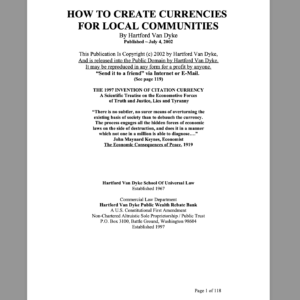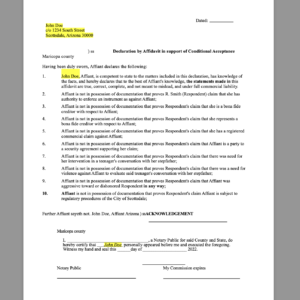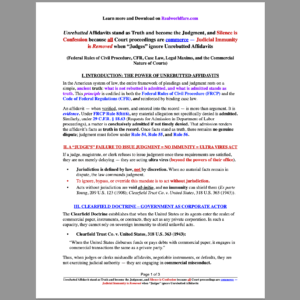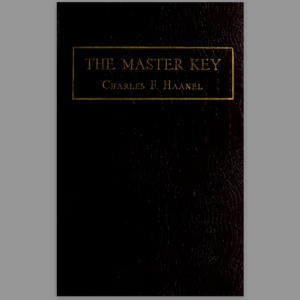In this ongoing $2.975 billion lawsuit against SDCCU, the defendants exhibit a profound misunderstanding of basic legal principles, particularly regarding the definition of “person” under 26 U.S. Code § 7701 and U.C.C. § 1-201(27). Their argument that trusts cannot sue companies or that a living individual cannot be represented by a non-attorney reveals a lack of comprehension of trust law and civil procedure. Additionally, their attempt to compel arbitration, despite the absence of any arbitration agreement, is both frivolous and legally unsound, as any such agreement procured by fraud is void ab initio. The defendants’ actions suggest either incompetence or a deliberate attempt to manipulate the legal process, warranting immediate summary judgment in favor of the plaintiffs
Plaintiffs’ Conditional Acceptance and Motion for Summary Judgment
In response to the ongoing actions of the defendants in the $2.975 billion lawsuit against the San Diego County Credit Union (SDCCU), the plaintiffs have issued a Plaintiffs’ Conditional Acceptance to Defendants’ Motion to Compel Arbitration and Stay Proceedings, as well as a Plaintiffs’ Demand/Motion to Compel Summary Judgment Without Hearing. This response comes after the defendants’ egregious misinterpretations and unsubstantiated legal arguments, which only serve to highlight their complete incompetence and failure to understand basic commercial and contract law principles.
The defendants have made several critical errors, particularly regarding the definition of “person” under both 26 U.S. Code § 7701 and U.C.C. § 1-201(27), which has led to the plaintiffs’ formal response demanding immediate summary judgment in their favor, without the need for any further hearing or arbitration.
Defendants’ Misinterpretation of “Person” Under 26 U.S. Code § 7701
One of the most glaring mistakes made by the defenhttps://realworldfare.com/wp-content/uploads/2024/11/SDCCU-Defendants-Motion-to-Compel-Arbitration-and-Stay-Proceedings.pdfdants involves their misinterpretation of the term “person” under 26 U.S. Code § 7701. Contrary to the defendants’ assertion, 26 U.S. Code § 7701 clearly defines the term “person” to include not only individuals but also entities such as trusts, estates, partnerships, corporations, and other legal or commercial entities. The defendants have either ignored this statutory definition or misunderstood its application in the context of this lawsuit. This fundamental misunderstanding of tax law is just one example of the defendants’ apparent incompetence.
Defendants’ Dispute of U.C.C. § 1-201(27) and the Term “Person”
In addition to their incorrect reading of 26 U.S. Code § 7701, the defendants further dispute the definition of “person” as stated in U.C.C. § 1-201(27). This provision clearly defines “person” to include a wide range of legal entities, such as individuals, corporations, business trusts, estates, trusts, partnerships, and more. Yet, the defendants have bizarrely attempted to argue that this definition is incorrect or irrelevant to the case at hand. Their argument fails to hold up under scrutiny, revealing a lack of understanding of basic commercial and contract law principles.
U.C.C. § 1-201. General Definitions.
” (27) “Person” means an individual, corporation, business trust, estate, trust, partnership, limited liability company, association, joint venture, government, governmental subdivision, agency, or instrumentality, public corporation, or any other legal or commercial entity. “
26 U.S. Code § 7701 – Definitions
“(1)Person: The term “person” shall be construed to mean and include an individual, a trust, estate, partnership, association, company or corporation.”
Frivolous Arguments Regarding Trusts and Representation
The defendants have also raised the absurd argument that a trust cannot sue a company or that a living man or woman cannot be represented by a “non-attorney” in legal proceedings. This argument is not only frivolous but entirely legally flawed. Trusts have long been recognized as having the ability to initiate legal actions, and individuals have the right to represent themselves or be represented by non-attorneys in specific legal contexts. Furthermore, a trust can be represented by an attorney in fact, in propria persona, or other lawful means, giving individuals extensive rights in public and private capacities. These misconceptions only further illustrate the defendants’ incompetence in understanding basic civil procedures and trust law.
Defendants Appear to Think They Are Above the Law
Despite the overwhelming evidence against their position, the defendants continue to act as if they are above the law or, at the very least, exhibit a profound ignorance of the law. Their refusal to accept established definitions and legal principles in favor of flawed and misguided arguments suggests either a lack of understanding of basic contract law or an intentional attempt to derail the legal proceedings. In either case, the defendants’ actions show they are not fit to engage in any further meaningful legal discussions without being corrected.
Plaintiffs continuously reaffirm the following precedent, legal maxims, and principles:
- ALL ARE EQUAL UNDER THE LAW. (God’s Law – Moral and Natural Law). Exodus 21:23-25; Lev. 24: 17-21; Deut. 1; 17, 19:21; Mat. 22:36-40; Luke 10:17; Col. 3:25. ‘No one is above the law.’
- AN UNREBUTTED AFFIDAVIT STANDS AS TRUTH IN COMMERCE. (12 Pet. 1:25; Heb. 6:13-15;). “He who does not deny, admits.”
- AN UNREBUTTED AFFIDAVIT BECOMES THE JUDGEMENT IN COMMERCE. (Heb. 6:16-17;). ‘There is nothing left to resolve.’
- TRUTH IS EXPRESSED IN THE FORM OF AN AFFIDAVIT. (Lev. 5:4-5; Lev. 6:3-5; Lev. 19:11-13: Num. 30:2; Mat. 5:33; James 5: 12).
- IN COMMERCE FOR ANY MATTER TO BE RESOLVED MUST BE EXPRESSED. (Heb. 4:16; Phil. 4:6; Eph. 6:19-21). — Legal maxim: ‘To lie is to go against the mind.’
- HE WHO LEAVES THE BATTLEFIELD FIRST LOSES BY DEFAULT. (Book of Job; Mat. 10:22) — Legal maxim: ‘He who does not repel a wrong when he can occasions it.’
- IN COMMERCE TRUTH IS SOVEREIGN. (Exodus 20:16; Ps. 117:2; John 8:32; II Cor. 13:8 ) Truth is sovereign — and the Sovereign tells only the truth.
- WORKMAN IS WORTHY OF HIS HIRE. The first of these is expressed in Exodus 20:15; Lev. 19:13; Mat. 10:10; Luke 10ʺ7; II Tim. 2:6. Legal maxim: ‘It is against equity for freemen not to have the free disposal of their own property.’
- “Statements of fact contained in affidavits which are not rebutted by the opposing party’s affidavit or pleadings may be accepted as true by the trial court.“ –Winsett v. Donaldson, 244 N.W.2d 355 (Mich. 1976).
- See, Sieb’s Hatcheries, Inc. v. Lindley, 13 F.R.D. 113 (1952)., “Defendant(s) made no request for an extension of time in which to answer the request for admission of facts and filed only an unsworn response within the time permitted,” thus, under the specific provisions of Ark. and Fed. R. Civ. P. 36, the facts in question were deemed admitted as true. Failure to answer is well established in the court. Beasley v. U. S., 81 F. Supp. 518 (1948)., “I, therefore, hold that the requests will be considered as having been admitted.” Also as previously referenced, “Statements of fact contained in affidavits which are not rebutted by the opposing party’s affidavit or pleadings may[must] be accepted as true by the trial court.“ –Winsett v. Donaldson, 244 N.W.2d 355 (Mich. 1976).
- ”The state cannot diminish Rights of the people.” —Hurtado vs. California, 110 US 516.
- ”Public officials are not immune from suit when they transcend their lawful authority by invading constitutional rights.”—AFLCIO v. Woodward, 406 F2d 137 t.
- “Immunity fosters neglect and breeds irresponsibility while liability promotes care and caution, which caution and care is owed by the government to its people.” (Civil Rights) Rabon vs Rowen Memorial Hospital, Inc. 269 N.S. 1, 13, 152 SE 1 d 485, 493.
- “When enforcing mere statutes, judges of all courts do not act judicially (and thus are not protected by “qualified” or “limited immunity,” – SEE: Owen v. City, 445 U.S. 662; Bothke v. Terry, 713 F2d 1404) – – “but merely act as an extension as an agent for the involved agency — but only in a “ministerial” and not a “discretionary capacity…” Thompson v. Smith, 154 S.E. 579, 583; Keller v. P.E., 261 US 428; F.R.C. v. G.E., 281, U.S. 464.
- “Judges not only can be sued over their official acts, but could be held liable for injunctive and declaratory relief and attorney’s fees.” Lezama v. Justice Court, A025829.
- “Ignorance of the law does not excuse misconduct in anyone, least of all in a sworn officer of the law.” In re McCowan (1917), 177 C. 93, 170 P. 1100.
- “All are presumed to know the law.” San Francisco Gas Co. v. Brickwedel (1882), 62 C. 641; Dore v. Southern Pacific Co. (1912), 163 C. 182, 124 P. 817; People v. Flanagan (1924), 65 C.A. 268, 223 P. 1014; Lincoln v. Superior Court (1928), 95 C.A. 35, 271 P. 1107; San Francisco Realty Co. v. Linnard (1929), 98 C.A. 33, 276 P. 368.
- “It is one of the fundamental maxims of the common law that ignorance of the law excuses no one.” Daniels v. Dean (1905), 2 C.A. 421, 84 P. 332.
- “the people, not the States, are sovereign.”—Chisholm v. Georgia, 2 Dall. 419, 2 U.S. 419, 1 L.Ed. 440 (1793).
Frivolous Request for Arbitration Without an Agreement
In one of their most egregious legal blunders, the defendants are pleading with the court to compel arbitration, despite the fact that no arbitration agreement exists between the parties. This request is completely unfounded, as arbitration clauses must be mutually agreed upon in advance, and in this case, there is no such agreement. Under contract law, any agreement made under fraudulent circumstances is void ab initio (from the beginning). The plaintiffs have provided unrebutted commercial affidavits which serve as prima facie evidence that the defendants’ assertions regarding arbitration clauses are without merit. These affidavits demonstrate that any contract the defendants believe they have is altered or negated under contract law, the Uniform Commercial Code (UCC), legal maxims, and commercial law merchant principles.
Fraudulent Agreements Cannot Stand: Void Ab Initio
The principle that any contract or agreement entered into under fraudulent circumstances is void ab initio is crucial in this case. The defendants’ claims regarding arbitration clauses are rooted in a misunderstanding or deliberate distortion of the facts. The plaintiffs have provided clear and convincing evidence through unrebutted VERIFIED commercial affidavits that any purported agreements or arbitration clauses have been altered or rendered void by the application of fundamental legal principles. The plaintiffs demand that the court dismiss the defendants’ claims and proceed to summary judgment without any further hearing or delay, as they have no valid legal standing.

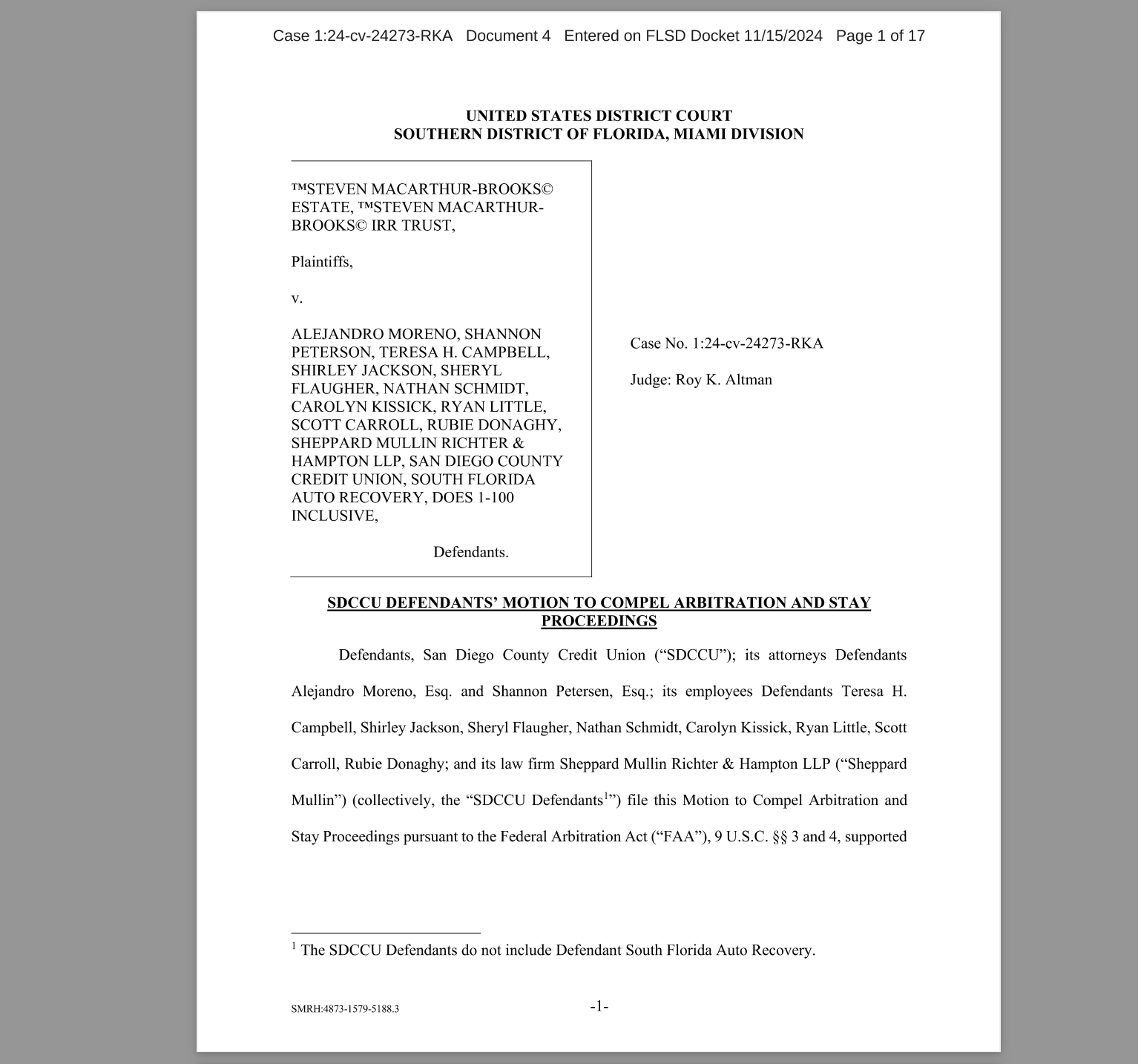
Conclusion: Summary Judgment Should Be Granted
In conclusion, the defendants’ blatant incompetence and their refusal to engage with established legal principles leave no room for further legal maneuvering. The plaintiffs, in their conditional acceptance and motion to compel summary judgment, have demonstrated that the defendants have no legal basis for their claims, particularly their frivolous request for arbitration. As a result, the plaintiffs demand that the court grant summary judgment immediately in the amount of $2.975 billion, without any further delay or hearing.
The defendants’ actions throughout this lawsuit have shown a disturbing lack of comprehension of contract law, the Uniform Commercial Code (U.C.C.), and basic legal principles. Their frivolous and misguided motions and arguments only serve to undermine their own position and highlight their complete incompetence in matters of law. The plaintiffs have made their case clearly, and the court must act promptly to uphold the rule of law and bring this matter to a just conclusion.




